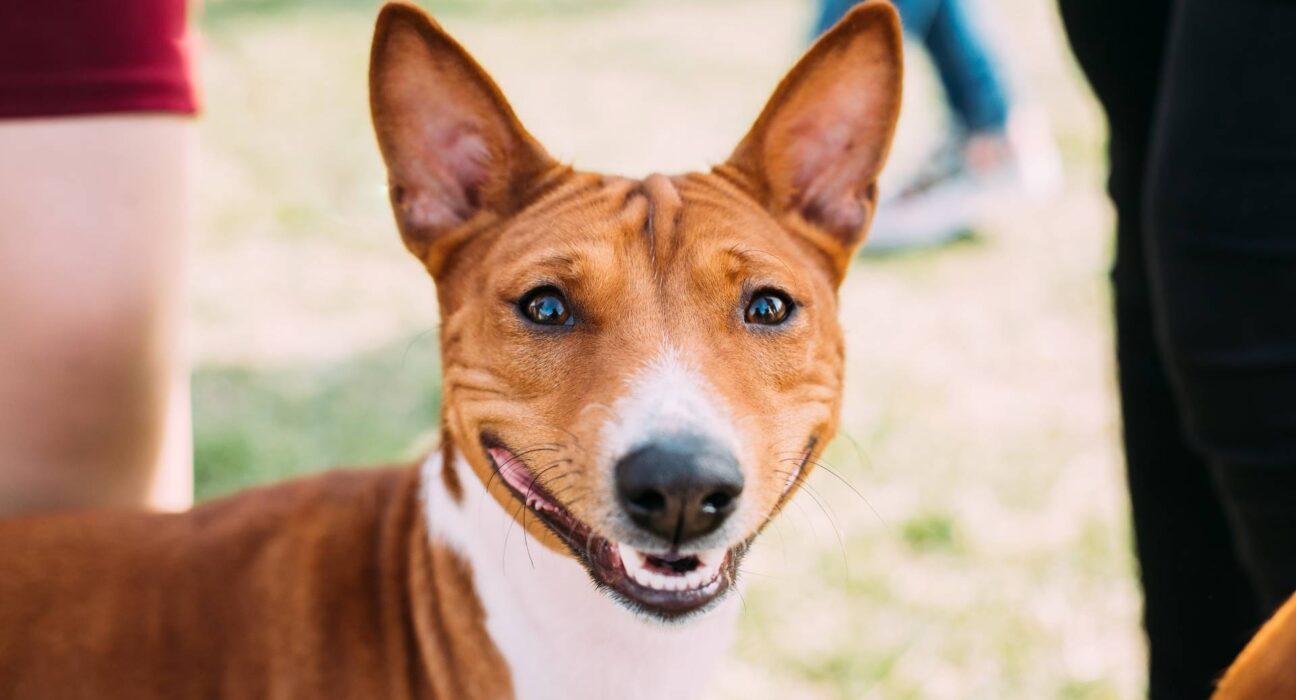The Basenji is a small-sized dog breed originating from Central Africa. Known for their intelligence and playful personalities, these dogs make great companions for families looking for loyal pets.
In addition to being an excellent companion, the Basenji is also known for its unique vocalizations that often sound like yodeling or howling.
They are incredibly independent yet affectionate towards their owners, making them a delightful addition to any family. Keep reading to learn more about this unique breed!
Basenji History
The Basenji has a long history stretching back thousands of years in central Africa, where the Pygmy people bred them as hunting and guard dogs.
Due to their agility and sharp senses, they were used to help hunt small game such as hares, birds, and even rodents.
Eventually, these dogs left Africa and were brought to the United Kingdom in 1895 by English explorer Charles Barrett.
In the following years, they quickly gained popularity due to their exotic looks and independent personalities.
Basenji Appearance
The Basenji has a unique appearance consisting of a short coat, usually reddish-brown or black, with white markings on its chest, feet, and muzzle.
They have almond-shaped eyes and pointed erect ears that make them appear alert at all times. The average size for a Basenji is 16-17 inches tall at the shoulder and weighs around 22-24 pounds when fully grown.
Basenji Temperament
Basenjis are a lively, independent breed that loves to explore and be active. They are brilliant and trainable if given the proper guidance and direction early in life.
Even though they can be independent sometimes, Basenjis have no problem showing affection to their owners when they feel like it.
They are also good with other animals, including cats and small children, when properly socialized from a young age. Despite their small size, these dogs make excellent watchdogs due to their alertness.
Basenji Care
The Basenji is ideal for those looking for an easy-to-care-for dog breed, as they require minimal grooming and bathing.
They are not fans of cold or wet weather, so it is best to keep them indoors when these conditions arise. Due to their high energy levels, Basenjis need plenty of exercise and mental stimulation to stay healthy and happy. A combination of walks and playtime in the yard should be enough for them.
Overall, the Basenji is a unique breed that makes for an excellent companion with its intelligence, affectionate nature, and independent personality.
With proper care and training, these dogs can make lifelong friends that will bring joy into any home they enter.
Common Health Issues And Concerns
Basenjis, an ancient dog breed, are generally hardy and healthy dogs. However, like all breeds, Basenji owners should be aware of specific health issues that can potentially arise.
Progressive Retinal Atrophy (PRA)
PRA is an eye disorder that can cause gradual vision loss in dogs due to the degeneration of light-sensitive cells in the retina.
While PRA cannot be cured, treatments are available to slow its progression. Regular check-ups with a veterinarian and yearly eye exams are essential for the early detection and management of this condition.
Fanconi Syndrome
Fanconi syndrome is a hereditary renal disease that affects Basenjis, causing electrolyte imbalance and kidney problems.
While there is no cure for Fanconi syndrome, it can be managed with a special diet, medication, and close monitoring by a veterinarian.
Immunoproliferative Small Intestinal Disease (IPSID)
IPSID is an immune system disorder affecting Basenji breeds. This disorder can cause dehydration, appetite and weight loss, vomiting, diarrhea, and abdominal pain. It is essential to seek immediate medical attention if these symptoms are present.
Hip Dysplasia
Hip dysplasia is a hereditary condition affecting many dog breeds, including Basenjis. It occurs when the growing puppy’s hip joint does not form correctly and can lead to arthritis in later life. Regular check-ups with a veterinarian and exercise can help manage hip dysplasia in affected dogs.
Patellar Luxation
Patellar luxation is an inherited disease where the kneecap slips out of place, causing lameness or discomfort in the affected limb. Surgery may be necessary to correct this problem and allow the dog to walk normally again.
Hypothyroidism
Hypothyroidism is a condition caused by an underactive thyroid gland that affects humans and dogs alike. Symptoms include lethargy, weight gain, hair loss, depression, and slow heart rate.
Treatment for hypothyroidism typically involves daily oral medication to restore the normal functioning of the thyroid gland.
Although these health issues can be concerning for a Basenji owner, it’s important to remember that many of these conditions can be managed successfully with regular veterinary check-ups, proper nutrition, and exercise.
With responsible pet ownership and good care practices, Basenji owners can enjoy many years of happy companionship with their beloved canine friends.
Exercise And Activity Requirements
The Basenji breed is known for its energy and intelligence, so it’s essential to keep them mentally stimulated and physically active. A daily walk of 30 minutes or more should be sufficient for the Basenji.
They also enjoy playing fetch, hiking, running around in a securely fenced-in area, and participating in agility courses.
For mental stimulation, activities such as puzzle toys, obedience training sessions, or even simple hide-and-seek can help keep your Basenji alert and engaged.
Generally speaking, this breed needs at least an hour of daily physical exercise to remain healthy and happy. They must also have access to plenty of fresh air and sunlight during their daily walks.
Basenjis do not require much grooming – just regular brushing to keep their coat shiny and healthy. Regular nail trims are also crucial for this breed.
A healthy diet should include high-quality dry kibble supplemented with fresh vegetables or fruits and occasional raw eggs or meat.
It’s essential to ensure that your Basenji gets the proper nutrients to maintain its energy levels, and it’s equally important to monitor its weight to avoid obesity as they can be prone to certain health conditions due to their small size, visiting the vet at least once a year is highly recommended.
Conclusion
The Basenji is a loyal breed that loves to explore and show affection towards its owners. Although they have unique appearances and vocalizations, these dogs are brilliant and easy to care for.
If you’re looking for a small-sized companion with an independent streak, the Basenji might be the perfect fit for your family. This breed will provide you with years of joy and companionship with proper training and care.

